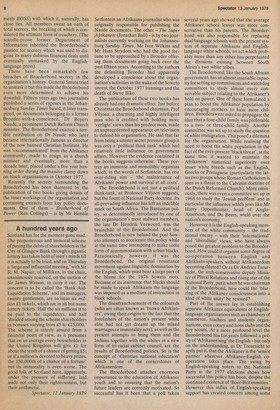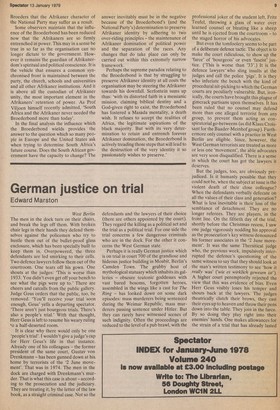A hundred years ago
Scotland has for the moment gone mad. The preposterous and immoral scheme of paying the debts of shareholders in the City of Glasgow Bank through a gigantic lottery has taken hold of men's minds till it is actually to be tried, and on Thursday a 'large and influential meeting,' with Sir R. M. Napier, of Milliken, in the chair, unanimously resolved, on the motion of Sir James Watson, to carry it out. The concern is to be called the 'Bank AidLiquidation Scheme,' and its managers, twenty gentlemen, are to issue six million El tickets, which are in all but name lottery tickets. Half the six millions is to be paid to the liquidators, and half 'divided among the scheme shareholders in bonuses varying from £5 to £25,000.' The scheme is utterly absurd from a financial point of view, as it presumes that on an average every householder in the United Kingdom will give £1 for about the tenth of a chance of getting £5; or if a million is devoted to heavy prizes, the 150,000th of a chance of a fortune' but its immorality is even worse. The good folk of Scotland have, apparently, under the pressure of suffering, laid aside not only their righteousness, but their arithmetic.
Spectator, 11 January 1879 Serfontein an Afrikaans journalist who was originally responsible for publishing the Naude documents. The other — The Super Afrikaners (Jonathan Ball) — is by two journalists currently working on the Johannesburg Sunday Times, Mr Ivor Wilkins and Mr Hans Strydom who had the good fortune to be approached by a Broeder offering them documents going back over the past fifteen years. According to the authors the defaulting Broeder had apparently developed a conscience about the organisation's activities in the wake of the Soweto unrest, the October 1977 bannings and the death of Steve Biko.
The publication of these two books has already had one dramatic effect. Just before Christmas the Broederbond chairman, Prof Viljoen, a charming and highly intelligent man who is credited with holding more 'verligte' views than his predecessors, made an unprecedented appearance on television to defend his organisation. He said that far from being a sinister secret pressure group it was only a 'political think tank' which had relatively little influence on government affairs. However the evidence contained in the .books suggests otherwise. These portray an immense and monolithic organism which, in the words of Serfontein, has one over-riding aim — 'the maintenance of Afrikaner power and survival at all costs'.
The Broederbond is not just a political think-tank, as Professor Viljoen suggests, but the fount of National Party doctrine. Its all-prevading influence has left an indelible mark on South Africa. The Bantustan policy, so determinedly introduced by one of the organisation's most stalwart members, the late Dr Hendrik Verwoerd, was the brainchild of the Broederbond. And the Broederbond is now behind the post Soweto attempts to accelerate this policy while at the same time attempting to make some form of accommodation with urban blacks. Paradoxically, however, it was the Broederbond, the original resistance movement against linguistic domination by the English, which must bear a large part of the blame for the 1976 Soweto riots. Because of its insistence that blacks should be made to speak Afrikaans the language was imposed as a medium of instruction in black schools.
The disenfranchisement of the coloureds (who are often known as 'brown Afrikianers', owing their origins to the fact that the forefathers of the nation's present white elite had not yet dreamt up the mixed marriages or immorality acts), as well as the present attempts to bring them and the Indians together with the whites in a new form of tri-racial cabinet council, are the results of Broederbond policies. So is the concept of 'Christian national education' which is one of the cornerstones of Afrikanerdom.
The Broederbond attaches enormous importance to the education of Afrikaner youth and to ensuring that the nation's future leaders are correctly motivated. So successful has it been that a poll taken several years ago showed that the average Afrikaner school leaver was more conservative than his parents. The Broeder bond was also responsible for replacing dual-language schools with the present system of separate Afrikaans and English language white schools, an act which probably more than any other has perpetuated the divisions existing between South Africa's two white tribes.
The Broederbond, like the South African government, has an almost insatiable capac ity for setting up commissions and watchdog committees to study almost every conceivable subject relating to the Afrikaner's hold on power. One of these formulated a plan to boost the Afrikaner population by encouraging mothers to have more chil dren. Broeders were asked to propagate the idea that a four-child family was preferable to a twoor three-child family. Another committee was set up to study the question of white immigration. This posed a dilemma for the organisation. While realising the need to boost the white population in the fact of the ever-present 'black threat', at the same time it wanted to maintain the Afrikaners' numerical superiority over lesser white breeds such as the English, Greeks or Portuguese (particularly the latter two groups whose Roman Catholicism is seen as a threat to the Calvinist doctrine of the Dutch Reformed Church). More ominously, there was even a committee set up in 1968 to study the 'Jewish problem' and in particular the influence which jews like Mr Harry Oppenheimer, head of AngloAmerican, and De Beers, wield over the nation's economy.
However it is the English-speaking members of the white community — the trad itional enemy — with their 'international' and 'liberalistic' views, who have always posed the greatest problem to the Broeder bond. How could it organise some degree of co-operation between English and Afrikaans-speakers without Afrikanerdom becoming diluted? Or as Dr Andries Treur nicht, the arch-conservative deputy Minister of Plural Relations and rising star of the National Party, put it when he was chairman of the Broederbond, how could the 'blurring of the Afrikaner consciousness into a kind of white unity' be resisted?
Part of the answer lay in establishing separate Afrikaner equivalents of English language organisations such as chambers of commerce, teachers and students organisations, even rotary and lions clubs and the boy scouts. At a more profound level the Broederbond has for years followed a policy of 'Afrikanerising' the English —but only on the understanding, as Dr Treurnicht so aptly put it, that the Afrikaner is the 'senior partner' wherever Afrikaner-English co operation takes place. The swing by English-speaking voters to the National Party in the 1977 elections shows how successful this policy has been, despite the continued existence of 'Boer-Brit enmities.' However this influx of English-speaking support has created concern among some Broeders that the Afrikaner character of the National Party may suffer as a result.
Some observers maintain that the influence of the Broederbond has been reduced now that the Afrikaners are so firmly entrenched in power. This may in a sense be true in so far as the organisation can no longer dictate to the government. However it remains the guardian of Afrikanerdom's spiritual and political conscience. It is the vehicle that ensures a common synchronised front is maintained between the party, the church, schools and universities and all other Afrikaner institutions. And it is above all the custodian of Afrikaner unity, the most important element in the Afrikaners' retention of power. As Prof Viljoen himself recently admitted, 'South Africa and the Afrikaner never needed the Broederbond more than today'.
In the final analysis the influence which the Broederbond wields provides the answer to the question which so many people in Europe and the United States ask when trying to determine South Africa's future course. Does the South African government have the capacity to change? The answer inevitably must be in the negative because of the Broederbond's (and the National Party's) determination to preserve Afrikaner identity by adhering to two over-riding principles — the maintenance of Afrikaner domination of political power and the separation of the races. Any changes that do take place can only be carried out within this extremely narrow framework.
Perhaps the supreme paradox relating to the Broederbond is that by struggling to preserve Afrikaner identity at all costs the organisation may be steering the Afrikaner towards his downfall. Serfontein sums up thus: 'with its distorted faith in a messianic mission, claiming biblical destiny and a God-given right to exist, the Broederbond has fostered a Masada mentality, a death wish. It refuses to accept the realities of Africa, the legitimate aspirations of the black majority. But with its very determination to retain and entrench forever Afrikaner domination, the Broederbond is actively treading those steps that will lead to the destruction of the very identity it so passionately wishes to preserve.'



































 Previous page
Previous page